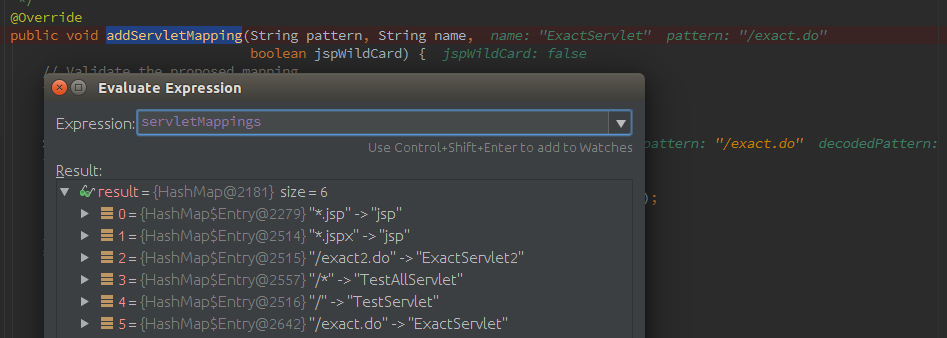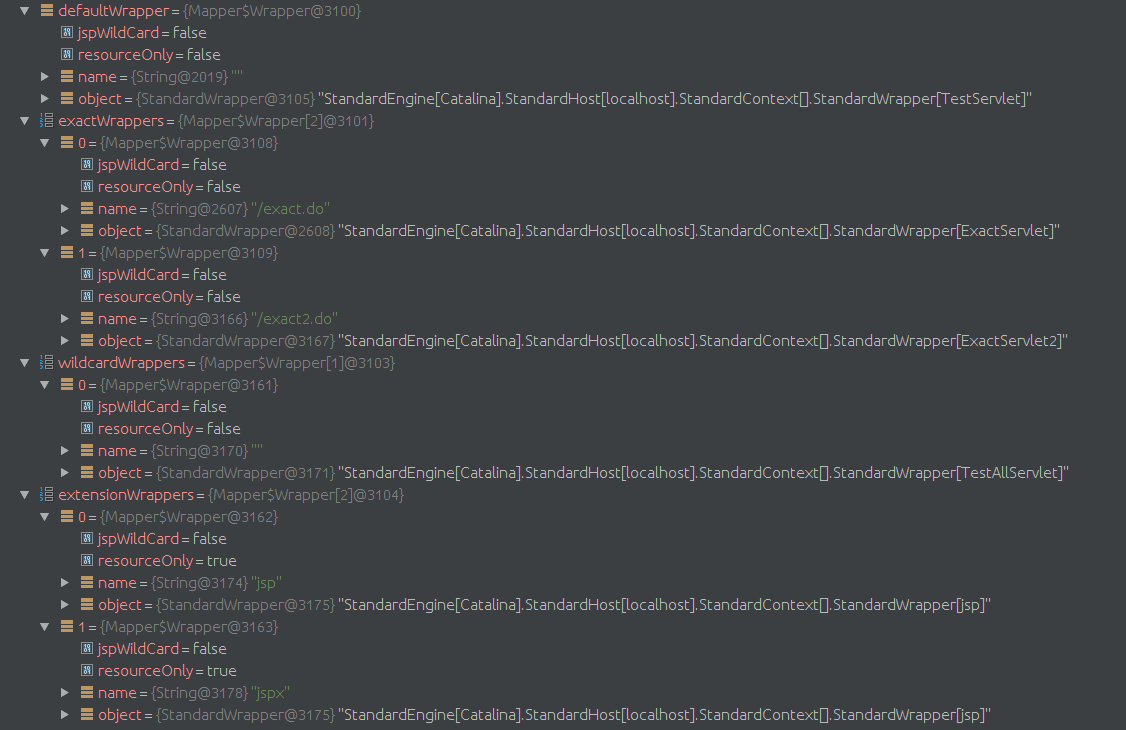url pattern
标准的web.xml的path pattern
url-pattern种类
| url-pattern | 翻译下下 | 对应wrapper(匹配规则) |
|---|---|---|
| path.endsWith(“/*”)* | 以 /* 结尾的 | Wildcard wrapper 通配符,匹配/xx /yy.xx |
| path.startsWith(“*.”) | 以 *. 开头的 | Extension wrapper 扩展,匹配xx.yy |
| path.equals(“/”) | / | Default wrapper |
| else | 以上3种之外的 | Exact wrapper 精确匹配 |
tomcat读取web.xml配置,调用addServletMappings将servlet加入StandardContext.ServletMappings中,tomcat自己有两个servlet,我们的web应用可以重写(web应用内url-pattern和servlet只能是一一对应的)
<!-- The mapping for the default servlet -->
<servlet-mapping>
<servlet-name>default</servlet-name>
<url-pattern>/</url-pattern>
</servlet-mapping>
<!-- The mappings for the JSP servlet -->
<servlet-mapping>
<servlet-name>jsp</servlet-name>
<url-pattern>*.jsp</url-pattern>
<url-pattern>*.jspx</url-pattern>
</servlet-mapping>
处理完后结果如下图:其中key是url-pattern value是servlet-name

addServletMapping会调用addWrapper将对应模式url-pattern加入对应的Mapper.ContextVersion.*wrappers中``

wrapper代表一个servlet,它负责管理一个Servlet,包括Servlet的装载,初始化,执行以及资源回收
tomcat处理顺序
- 精确匹配
exact match对应 exactWrappers - 前缀匹配
prefix match对应wildcardWrappers - 扩展匹配
extension match对应extensionWrappers - 使用资源文件来处理servlet,使用contextVersion的welcomeResources属性,这个属性是个字符串数组 * 精确匹配 * 前缀匹配 * 文件夹
- 默认的servlet来处理 对应default wrapper
ant_style
Ant path 匹配原则 路径匹配原则(Path Matching) Spring MVC中的路径匹配要比标准的web.xml要灵活的多。默认的策略实现了 org.springframework.util.AntPathMatcher,就像名字提示的那样,路径模式是使用了Apache Ant的样式路径,Apache Ant样式的路径有三种通配符匹配方法(在下面的表格中列出) 这些可以组合出很多种灵活的路径模式
| Wildcard | Description |
|---|---|
| ? | 匹配任何单字符 |
| * | 匹配0或者任意数量的字符 |
| ** | 匹配0或者更多的目录 |
例子
| Path | Description |
|---|---|
| /app/*.x | 匹配(Matches)所有在app路径下的.x文件 |
| /app/p?ttern | 匹配(Matches) /app/pattern 和 /app/pXttern,但是不包括/app/pttern |
| /**/example | 匹配(Matches) /app/example, /app/foo/example, 和 /example |
| /app/**/dir/file. | 匹配(Matches) /app/dir/file.jsp, /app/foo/dir/file.html,/app/foo/bar/dir/file.pdf, 和 /app/dir/file.java |
| /*/.jsp | 匹配(Matches)任何的.jsp 文件 |
附录
addWrapper:tomcat读取web.xml,将servlet分别加入对应的wrapper中 internalMapWrapper: 按照一定的处理顺序,将请求分别打给对应的wrapper,交给该wrapper的servlet处理
addWrapper
/**
* Adds a wrapper to the given context.
*
* @param context The context to which to add the wrapper
* @param path Wrapper mapping
* @param wrapper The Wrapper object
* @param jspWildCard true if the wrapper corresponds to the JspServlet
* @param resourceOnly true if this wrapper always expects a physical
* resource to be present (such as a JSP)
* and the mapping path contains a wildcard; false otherwise
*/
protected void addWrapper(ContextVersion context, String path,
Object wrapper, boolean jspWildCard, boolean resourceOnly) {
synchronized (context) {
Wrapper newWrapper = new Wrapper();
newWrapper.object = wrapper;
newWrapper.jspWildCard = jspWildCard;
newWrapper.resourceOnly = resourceOnly;
if (path.endsWith("/*")) {
// Wildcard wrapper
newWrapper.name = path.substring(0, path.length() - 2);
Wrapper[] oldWrappers = context.wildcardWrappers;
Wrapper[] newWrappers =
new Wrapper[oldWrappers.length + 1];
if (insertMap(oldWrappers, newWrappers, newWrapper)) {
context.wildcardWrappers = newWrappers;
int slashCount = slashCount(newWrapper.name);
if (slashCount > context.nesting) {
context.nesting = slashCount;
}
}
} else if (path.startsWith("*.")) {
// Extension wrapper
newWrapper.name = path.substring(2);
Wrapper[] oldWrappers = context.extensionWrappers;
Wrapper[] newWrappers =
new Wrapper[oldWrappers.length + 1];
if (insertMap(oldWrappers, newWrappers, newWrapper)) {
context.extensionWrappers = newWrappers;
}
} else if (path.equals("/")) {
// Default wrapper
newWrapper.name = "";
context.defaultWrapper = newWrapper;
} else {
// Exact wrapper
if (path.length() == 0) {
// Special case for the Context Root mapping which is
// treated as an exact match
newWrapper.name = "/";
} else {
newWrapper.name = path;
}
Wrapper[] oldWrappers = context.exactWrappers;
Wrapper[] newWrappers =
new Wrapper[oldWrappers.length + 1];
if (insertMap(oldWrappers, newWrappers, newWrapper)) {
context.exactWrappers = newWrappers;
}
}
}
}
internalMapWrapper
/**
* Wrapper mapping.
*/
private final void internalMapWrapper(ContextVersion contextVersion,
CharChunk path,
MappingData mappingData)
throws Exception {
int pathOffset = path.getOffset();
int pathEnd = path.getEnd();
int servletPath = pathOffset;
boolean noServletPath = false;
int length = contextVersion.path.length();
if (length != (pathEnd - pathOffset)) {
servletPath = pathOffset + length;
} else {
noServletPath = true;
path.append('/');
pathOffset = path.getOffset();
pathEnd = path.getEnd();
servletPath = pathOffset+length;
}
path.setOffset(servletPath);
// Rule 1 -- Exact Match
Wrapper[] exactWrappers = contextVersion.exactWrappers;
internalMapExactWrapper(exactWrappers, path, mappingData);
// Rule 2 -- Prefix Match
boolean checkJspWelcomeFiles = false;
Wrapper[] wildcardWrappers = contextVersion.wildcardWrappers;
if (mappingData.wrapper == null) {
internalMapWildcardWrapper(wildcardWrappers, contextVersion.nesting,
path, mappingData);
if (mappingData.wrapper != null && mappingData.jspWildCard) {
char[] buf = path.getBuffer();
if (buf[pathEnd - 1] == '/') {
/*
* Path ending in '/' was mapped to JSP servlet based on
* wildcard match (e.g., as specified in url-pattern of a
* jsp-property-group.
* Force the context's welcome files, which are interpreted
* as JSP files (since they match the url-pattern), to be
* considered. See Bugzilla 27664.
*/
mappingData.wrapper = null;
checkJspWelcomeFiles = true;
} else {
// See Bugzilla 27704
mappingData.wrapperPath.setChars(buf, path.getStart(),
path.getLength());
mappingData.pathInfo.recycle();
}
}
}
if(mappingData.wrapper == null && noServletPath) {
// The path is empty, redirect to "/"
mappingData.redirectPath.setChars
(path.getBuffer(), pathOffset, pathEnd-pathOffset);
path.setEnd(pathEnd - 1);
return;
}
// Rule 3 -- Extension Match
Wrapper[] extensionWrappers = contextVersion.extensionWrappers;
if (mappingData.wrapper == null && !checkJspWelcomeFiles) {
internalMapExtensionWrapper(extensionWrappers, path, mappingData,
true);
}
// Rule 4 -- Welcome resources processing for servlets
if (mappingData.wrapper == null) {
boolean checkWelcomeFiles = checkJspWelcomeFiles;
if (!checkWelcomeFiles) {
char[] buf = path.getBuffer();
checkWelcomeFiles = (buf[pathEnd - 1] == '/');
}
if (checkWelcomeFiles) {
for (int i = 0; (i < contextVersion.welcomeResources.length)
&& (mappingData.wrapper == null); i++) {
path.setOffset(pathOffset);
path.setEnd(pathEnd);
path.append(contextVersion.welcomeResources[i], 0,
contextVersion.welcomeResources[i].length());
path.setOffset(servletPath);
// Rule 4a -- Welcome resources processing for exact macth
internalMapExactWrapper(exactWrappers, path, mappingData);
// Rule 4b -- Welcome resources processing for prefix match
if (mappingData.wrapper == null) {
internalMapWildcardWrapper
(wildcardWrappers, contextVersion.nesting,
path, mappingData);
}
// Rule 4c -- Welcome resources processing
// for physical folder
if (mappingData.wrapper == null
&& contextVersion.resources != null) {
Object file = null;
String pathStr = path.toString();
try {
file = contextVersion.resources.lookup(pathStr);
} catch(NamingException nex) {
// Swallow not found, since this is normal
}
if (file != null && !(file instanceof DirContext) ) {
internalMapExtensionWrapper(extensionWrappers, path,
mappingData, true);
if (mappingData.wrapper == null
&& contextVersion.defaultWrapper != null) {
mappingData.wrapper =
contextVersion.defaultWrapper.object;
mappingData.requestPath.setChars
(path.getBuffer(), path.getStart(),
path.getLength());
mappingData.wrapperPath.setChars
(path.getBuffer(), path.getStart(),
path.getLength());
mappingData.requestPath.setString(pathStr);
mappingData.wrapperPath.setString(pathStr);
}
}
}
}
path.setOffset(servletPath);
path.setEnd(pathEnd);
}
}
/* welcome file processing - take 2
* Now that we have looked for welcome files with a physical
* backing, now look for an extension mapping listed
* but may not have a physical backing to it. This is for
* the case of index.jsf, index.do, etc.
* A watered down version of rule 4
*/
if (mappingData.wrapper == null) {
boolean checkWelcomeFiles = checkJspWelcomeFiles;
if (!checkWelcomeFiles) {
char[] buf = path.getBuffer();
checkWelcomeFiles = (buf[pathEnd - 1] == '/');
}
if (checkWelcomeFiles) {
for (int i = 0; (i < contextVersion.welcomeResources.length)
&& (mappingData.wrapper == null); i++) {
path.setOffset(pathOffset);
path.setEnd(pathEnd);
path.append(contextVersion.welcomeResources[i], 0,
contextVersion.welcomeResources[i].length());
path.setOffset(servletPath);
internalMapExtensionWrapper(extensionWrappers, path,
mappingData, false);
}
path.setOffset(servletPath);
path.setEnd(pathEnd);
}
}
// Rule 7 -- Default servlet
if (mappingData.wrapper == null && !checkJspWelcomeFiles) {
if (contextVersion.defaultWrapper != null) {
mappingData.wrapper = contextVersion.defaultWrapper.object;
mappingData.requestPath.setChars
(path.getBuffer(), path.getStart(), path.getLength());
mappingData.wrapperPath.setChars
(path.getBuffer(), path.getStart(), path.getLength());
}
// Redirection to a folder
char[] buf = path.getBuffer();
if (contextVersion.resources != null && buf[pathEnd -1 ] != '/') {
Object file = null;
String pathStr = path.toString();
try {
file = contextVersion.resources.lookup(pathStr);
} catch(NamingException nex) {
// Swallow, since someone else handles the 404
}
if (file != null && file instanceof DirContext) {
// Note: this mutates the path: do not do any processing
// after this (since we set the redirectPath, there
// shouldn't be any)
path.setOffset(pathOffset);
path.append('/');
mappingData.redirectPath.setChars
(path.getBuffer(), path.getStart(), path.getLength());
} else {
mappingData.requestPath.setString(pathStr);
mappingData.wrapperPath.setString(pathStr);
}
}
}
path.setOffset(pathOffset);
path.setEnd(pathEnd);
}
[1]http://www.cnblogs.com/fangjian0423/p/servletcontainer-tomcat-urlpattern.html
[2]http://stackoverflow.com/questions/4140448/difference-between-and-in-servlet-mapping-url-pattern

